 W
WThe 20th Century Fox Hour is an American drama anthology series televised in the United States on CBS from 1955 to 1957. Some of the shows in this series were restored, remastered and shown on the Fox Movie Channel in 2002 under the title Hour of Stars. The season one episode Overnight Haul, starring Richard Conte and Lizabeth Scott, was released in Australia as a feature film.
 W
WThe Alcoa Hour is an American anthology television series that was aired live on NBC from 1955 to 1957. The series was sponsored by Alcoa.
 W
WAlcoa Presents: One Step Beyond was an American anthology series created by Merwin Gerard. The original series was broadcast for three seasons by the American Broadcasting Company (ABC) from January 1959 to July 1961.
 W
WAlcoa Theatre is a half-hour American anthology series telecast on NBC at 9:30 pm on Monday nights from September 30, 1957–May 23, 1960. The program also aired under the title Turn of Fate. Alcoa Theatre was syndicated together with Goodyear Theatre as Award Theatre.
 W
WAlfred Hitchcock Presents is an American television anthology series created, hosted, and produced by Alfred Hitchcock, and aired on CBS and NBC between 1955 and 1965. It features dramas, thrillers, and mysteries. Between 1962 and 1965 it was renamed The Alfred Hitchcock Hour. Hitchcock himself directed a relatively small number of episodes.
 W
WArmstrong Circle Theatre is an American anthology drama television series which ran from 1950 to 1957 on NBC, and then until 1963 on CBS. It alternated weekly with The U.S. Steel Hour. It finished in the Nielsen ratings at #19 for the 1950-1951 season and #24 for 1951-1952. The principal sponsor was Armstrong World Industries.
 W
WThe Bigelow Theatre is an American anthology series originally broadcast on CBS Television and on the DuMont Television Network.
 W
WCameo Theatre is an American anthology series that aired on NBC during the Golden Age of Television, from 1950 to 1955.
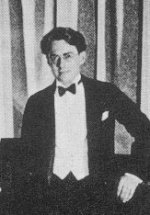 W
WCavalcade of America is an anthology drama series that was sponsored by the DuPont Company, although it occasionally presented musicals, such as an adaptation of Show Boat, and condensed biographies of popular composers. It was initially broadcast on radio from 1935 to 1953, and later on television from 1952 to 1957. Originally on CBS, the series pioneered the use of anthology drama for company audio advertising.
 W
WClimax! is an American television anthology series that aired on CBS from 1954 to 1958. The series was hosted by William Lundigan and later co-hosted by Mary Costa. It was one of the few CBS programs of that era to be broadcast in color. Many of the episodes were performed and broadcast live, and although the series was transmitted in color, only black-and-white kinescope copies of some episodes survive to the present day. The series finished at #22 in the Nielsen ratings for the 1955-1956 season and #26 for 1956-1957.
 W
WConflict is a 1956 to 1957 American ABC television series that was a successor to the earlier Warner Bros. Presents. Although Conflict assumed the same time slot as its predecessor, the two do not share the same format. Where Warner Bros. Presents had been a wheel series, Conflict was fully an anthological series. However, since Cheyenne and Conflict alternated the Tuesday 7:30 P.M. time slot, the net effect was that of a proper wheel series—even though Cheyenne and Conflict were not under the same umbrella title.
 W
WCrossroads was an American television anthology series based on the activities of clergy from different denominations. It aired from October 1955 to June 1956 on ABC. The series' second season aired from October 1956 to June 1957 in syndication.
 W
WDanger is a television series which first aired on September 19, 1950, and ended in May 1955. The first episode, entitled "The Black Door", was directed by Yul Brynner, based on a story by Henry Norton and a teleplay by Irving Elman, and starring Dane Clark and Olive Deering.
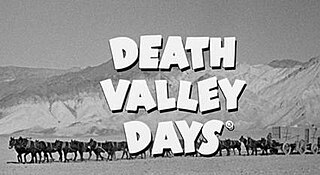 W
WDeath Valley Days is an American old-time radio and television anthology series featuring true accounts of the American Old West, particularly the Death Valley country of southeastern California. Created in 1930 by Ruth Woodman, the program was broadcast on radio until 1945. From 1952 to 1970, it became a syndicated television series, with reruns continuing through August 1, 1975. The radio and television versions combined to make the show "one of the longest-running Western programs in broadcast history."
 W
WDick Powell's Zane Grey Theatre, sometimes simply called Zane Grey Theatre, is an American Western anthology series which ran on CBS from 1956 to 1961.
 W
WDuPont Show of the Month was a 90-minute television anthology series that aired monthly on CBS from 1957 to 1961. The DuPont Company also sponsored a weekly half-hour anthology drama series hosted by June Allyson, The DuPont Show with June Allyson (1959–61).
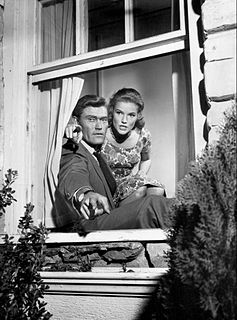 W
WThe DuPont Show with June Allyson is an American anthology drama series which aired on CBS from September 21, 1959, to April 3, 1961, with rebroadcasts continuing until June 12, 1961. The series was hosted by actress June Allyson and was a Four Star-Pamric Production.
 W
WThe Elgin Hour is a 60-minute live American anthology drama that aired from October 5, 1954 to June 14, 1955, on ABC, alternating with The U.S. Steel Hour.
 W
WFamily Theater was a weekly half-hour dramatic anthology radio program which aired on the Mutual Broadcasting System (MBS) in the United States from February 13, 1947, to September 11, 1957.
 W
WFireside Theatre, a.k.a. Jane Wyman Presents, is an American anthology drama series that ran on NBC from 1949 to 1958, and was the first successful filmed series on American television. Productions were low budget and often based on public domain stories or written by freelance writers such as Rod Serling. While it was panned by critics, it remained in the top ten most popular shows for most of its run. It predated the other major pioneer of filmed TV in America, I Love Lucy, by two years. Jacques Tourneur has directed in 1956 three episodes, A Hero Return, Kirsti, and The Mirror.
 W
WFord Star Jubilee was an American anthology series that aired once a month on Saturday nights on CBS at 9:00 P.M., E.S.T. from the fall of 1955 to the fall of 1956. The series was approximately 90 minutes long, broadcast in black-and-white and color, and was typically telecast live. Ford Star Jubilee was sponsored by the Ford Motor Company.
 W
WFour Star Playhouse is an American television anthology series that ran from 1952 to 1956. Four Star Playhouse was owned by Four Star International. Its episodes ranged anywhere from surreal mysteries, such as "The Man on the Train", to light comedies, such as "The Lost Silk Hat". The original premise was that Charles Boyer, Ida Lupino, David Niven, and Dick Powell would take turns starring in episodes. However, several other performers took the lead from time to time, including Ronald Colman and Joan Fontaine.
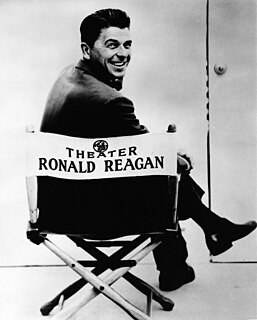 W
WGeneral Electric Theater was an American anthology series hosted by Ronald Reagan that was broadcast on CBS radio and television. The series was sponsored by General Electric's Department of Public Relations.
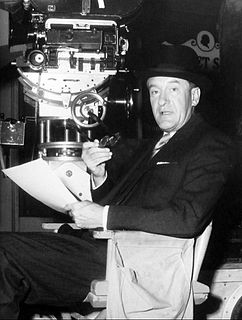 W
WThe George Sanders Mystery Theater is the title of a 30-minute American television mystery drama series hosted by character actor George Sanders which aired Sundays on NBC in the summer of 1957, replacing the first half of Caesar's Hour.
 W
WHallmark Hall of Fame, originally called Hallmark Television Playhouse, is an anthology program on American television, sponsored by Hallmark Cards, a Kansas City-based greeting card company. The longest-running prime-time series in the history of television, it first aired in 1951 and continues into the present day. From 1954 onward, all of its productions have been broadcast in color. It was one of the first video productions to telecast in color, a rarity in the 1950s. Many television movies have been shown on the program since its debut, though the program began with live telecasts of dramas and then changed to videotaped productions before finally changing to filmed ones.
 W
WThe Joseph Cotten Show is an American anthology series hosted by and occasionally starring Joseph Cotten. The series, which first aired on NBC, aired 31 episodes from September 14, 1956, to September 13, 1957. Four other new episodes were broadcast on CBS in Summer 1959.
 W
WThe Kaiser Aluminum Hour is a dramatic anthology television series which was broadcast in prime time in the United States during the 1956-57 season by NBC.
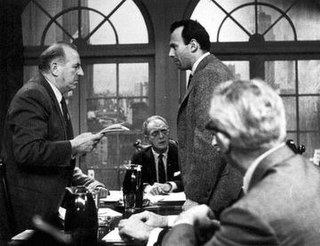 W
WKraft Television Theatre is an American anthology drama television series that began May 7, 1947 on NBC, airing at 7:30pm on Wednesday evenings until December of that year. It first promoted MacLaren's Imperial Cheese, which was advertised nowhere else. In January 1948, it moved to 9pm on Wednesdays, continuing in that timeslot until 1958. Initially produced by the J. Walter Thompson advertising agency, the live hour-long series offered television plays with new stories and new characters each week, in addition to adaptations of such classics as A Christmas Carol and Alice in Wonderland. The program was broadcast live from Studio 8-H at 30 Rockefeller Plaza, currently the home of Saturday Night Live.
 W
WLights Out is an American old-time radio program devoted mostly to horror and the supernatural.
 W
WThe Loretta Young Show is an American anthology drama television series broadcast on Sunday nights from September 2, 1953, to June 4, 1961, on NBC for a total of 165 episodes. The series was hosted by actress Loretta Young, who also played the lead in various episodes.
 W
WLux Video Theatre is an American television anthology series that was produced from 1950 until 1957. The series presented both comedy and drama in original teleplays, as well as abridged adaptations of films and plays.
 W
WThe Millionaire is an American anthology series that aired on CBS from 1955 to 1960. It was originally sponsored by Colgate-Palmolive. The series, produced by Don Fedderson and Fred Henry, explored the ways that sudden and unexpected wealth changed life, for better or for worse. It told the stories of people who were given one million dollars from a benefactor who insisted they must never know his identity, with one exception.
 W
WMatinee Theater is an American anthology series that aired on NBC during the Golden Age of Television, from October 31, 1955, to June 27, 1958. Its name is often seen as Matinee Theatre.
 W
WNBC Sunday Showcase was a series of hour-long specials telecast in color on NBC during the 1959-60 season. The flexible anthology format varied weekly from comedies and science fiction to musicals and historical dramas. The recent introduction of videotape made repeats possible, and two 1959 dramas had repeats in 1960.
 W
WPanic!, broadcast as No Warning! during its second season, is a half-hour American television anthology series. Its 31 episodes aired on NBC from 1957 to 1958. The series host was Westbrook Van Voorhis. Among notable guest stars were James Mason, James Whitmore, Trevor Bardette, Robert Vaughn, Barbara Billingsley, Paul Burke (actor), William Fawcett, Vivi Janiss, Mercedes McCambridge, Ann Rutherford, Ray Teal, and Carolyn Jones.
 W
WPlayhouse 90 was an American television anthology drama series that aired on CBS from 1956 to 1960 for a total of 133 episodes. The show was produced at CBS Television City in Los Angeles, California. Since live anthology drama series of the mid-1950s usually were hour-long shows, the title highlighted the network's intention to present something unusual: a weekly series of hour-and-a-half-long dramas rather than 60-minute plays.
 W
WPlaywrights '56, a.k.a. The Playwright Hour, is a 60-minute live American dramatic anthology series produced by Fred Coe for Showtime Productions. Twenty episodes aired on NBC from 1955 to 1956.
 W
WPond's Theater was a 60-minute television anthology series sponsored by Pond's Creams that was produced by the J. Walter Thompson Agency on ABC-TV. Its original title was Kraft Television Theatre, but when Kraft decided to drop the Thursday night version on the American Broadcasting Company (ABC) Pond's took over the sponsorship and retitled the series Pond's Theater. Twenty-five episodes aired on ABC from January 13, 1955 to July 7, 1955.
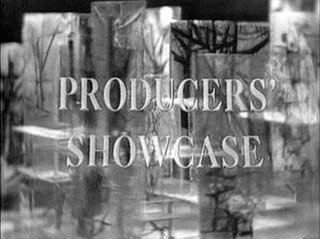 W
WProducers' Showcase is an American anthology television series that was telecast live during the 1950s in compatible color by NBC. With top talent, the 90-minute episodes, covering a wide variety of genres, aired under the title every fourth Monday at 8 pm ET for three seasons, beginning October 18, 1954. The final episode, the last of 37, was broadcast May 27, 1957.
 W
WPursuit is an American television anthology drama series which aired live on CBS from October 1958 to January 1959.
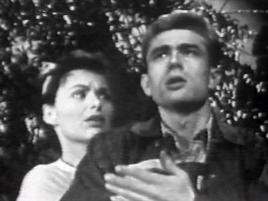 W
WRobert Montgomery Presents is an American dramatic television series which was produced by NBC from January 30, 1950, until June 24, 1957. The live show had several sponsors during its eight-year run, and the title was altered to feature the sponsor, usually Lucky Strike cigarettes, for example, Robert Montgomery Presents Your Lucky Strike Theater, ....The Johnson's Wax Program, and so on.
 W
WSchlitz Playhouse of Stars is an anthology series that was telecast from 1951 until 1959 on CBS. Offering both comedies and drama, the series was sponsored by the Joseph Schlitz Brewing Company. The title was shortened to Schlitz Playhouse, beginning with the fall 1957 season.
 W
WScience Fiction Theatre is an American science fiction anthology TV series syndicated and broadcast from 1955 to 1957. It was produced by Ivan Tors and Maurice Ziv. A total of 78 episodes were produced.
 W
WThe Seven Lively Arts is an American anthology series that aired on Sunday afternoons in 1957 on CBS television. The series was executive produced by John Houseman, and hosted by New York Herald Tribune critic John Crosby. Alfredo Antonini served as the musical director for several episodes. The title was taken from the influential book of the same name written by the cultural critic Gilbert Seldes, in which he argued that the low arts deserved as much critical attention as the high arts. The eleven programs produced were—not in order:"The Revivalists" – a profile of contemporary evangelism "Hollywood around the World" – a profile of overseas film productions directed by Mel Ferrer "The Blast in Centralia #5" – about a 1947 mine blast in Centralia, Illinois "Here is New York" – an essay about the city written by E. B. White and narrated by E. G. Marshall. "A Few Folks And Their Songs" – a program on folk music, hosted by Theodore Bikel "The Nutcracker" – the first television production of Tchaikovsky's ballet "The World of Nick Adams" – an adaptation combining five early Ernest Hemingway stories "Profile of a Composer" – a profile of American composer and choralist Norman Dello Joio "Gold Rush" – a ballet choreographed by Agnes de Mille "The Sound of Jazz" – The top jazz musicians of the day performing live. "The Changing Ways of Love" – the opening program, starring Piper Laurie and Jason Robards, written by S.J. Perelman
 W
WShirley Temple's Storybook is a 1958-1961 American children's anthology series hosted and narrated by actress Shirley Temple. The series features adaptations of fairy tales like Mother Goose and other family-oriented stories performed by well-known actors, although one episode, an adaptation of Nathaniel Hawthorne's 1851 novel The House of the Seven Gables, was meant for older youngsters.
 W
WThe Silver Theatre is a television series that was broadcast on the CBS television network from 1949 to 1950. Hosted by Conrad Nagel, it was a live anthology series consisting of dramatic teleplays about romance. It was sponsored by the International Silver Company. Per an episode on the Internet Archive the series ran 25 minutes excluding commercials. There were a total of thirty-nine episodes.
 W
WStar Stage was a half-hour US anthology series. It was sponsored by Campbell Soup Company and hosted by Jeffrey Lynn, who became host on the November 18th telecast. Thirty-nine episodes aired on the National Broadcasting Company (NBC) from 1955–56. Two-thirds of the episodes were done live and the remainder were filmed.
 W
WStudio 57 is an American anthology series that was broadcast on the now-defunct DuMont Television Network from September 1954 to July 1955, and in syndication from 1955 to 1958.
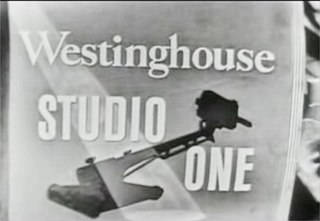 W
WStudio One is an American radio anthology drama series that was also adapted to television. It was created in 1947 by Canadian director Fletcher Markle, who came to CBS from the CBC. It aired under several variant titles: Studio One in Hollywood, Studio One Summer Theatre, Westinghouse Studio One and Westinghouse Summer Theatre.
 W
WSuspense is an American television anthology series that ran on CBS Television from 1949 to 1954. It was adapted from the radio program of the same name which ran from 1942 to 1962.
 W
WTales of Tomorrow is an American anthology science fiction series that was performed and broadcast live on ABC from 1951 to 1953. The series covered such stories as Frankenstein, starring Lon Chaney, Jr., 20,000 Leagues Under the Sea starring Thomas Mitchell as Captain Nemo, and many others.
 W
WTelephone Time is an American anthology drama series that aired on CBS in 1956, and on ABC from 1957 to 1958. The series features plays by John Nesbitt who hosted the first season. Frank C. Baxter hosted the 1957 and 1958 seasons. The program was directed by Arthur Hiller, Robert Florey, and Lewis Allen (director). A total of 81 episodes aired from April 1956 to March 1957 on CBS, and from April 1957 to April 1958 on ABC.
 W
WTV Reader's Digest is the title of a 30-minute American television anthology drama series which aired on the ABC from 1955 to 1956. Its theme music was "Polonaise" from Act III of Eugene Onegin.
 W
WThe Twilight Zone is an American media franchise based on the anthology television series created by Rod Serling. The episodes are in various genres, including fantasy, science fiction, absurdism, dystopian fiction, suspense, horror, supernatural drama, black comedy, and psychological thriller, often concluding with a macabre or unexpected twist, and usually with a moral. A popular and critical success, it introduced many Americans to common science fiction and fantasy tropes. The first series, shot entirely in black and white, ran on CBS for five seasons from 1959 to 1964.
 W
WThe Twilight Zone is an American anthology television series created and presented by Rod Serling, which ran for five seasons on CBS from 1959 to 1964. Each episode presents a stand-alone story in which characters find themselves dealing with often disturbing or unusual events, an experience described as entering "the Twilight Zone," often with a surprise ending and a moral. Although predominantly science-fiction, the show's paranormal and Kafkaesque events leaned the show towards fantasy and horror. The phrase “twilight zone,” inspired by the series, is used to describe surreal experiences.
 W
WThe United States Steel Hour is an anthology series which brought hour long dramas to television from 1953 to 1963. The television series and the radio program that preceded it were both sponsored by the United States Steel Corporation.
 W
WThe Walt Disney Company has produced its flagship anthology television series under several different titles since 1954.
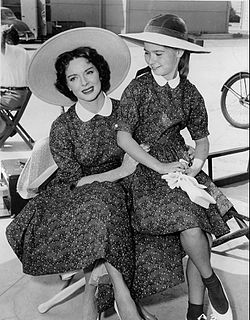 W
WWarner Bros. Presents is the umbrella title for three series that were telecast as part of the 1955-56 season on ABC: Cheyenne, a new Western series that originated on Presents, and two based on classic Warner Bros motion picture properties, becoming Casablanca and Kings Row .
 W
WThe West Point Story, also known simply as West Point, is a dramatic anthology television series shown in the United States by CBS during the 1956–57 season and by ABC during the 1957–58 season.
 W
WWestinghouse Desilu Playhouse is an American television anthology series produced by Desilu Productions. The show ran on the Columbia Broadcasting System between 1958 and 1960. Three of its 48 episodes served as pilots for the 1950s television series The Twilight Zone and The Untouchables.